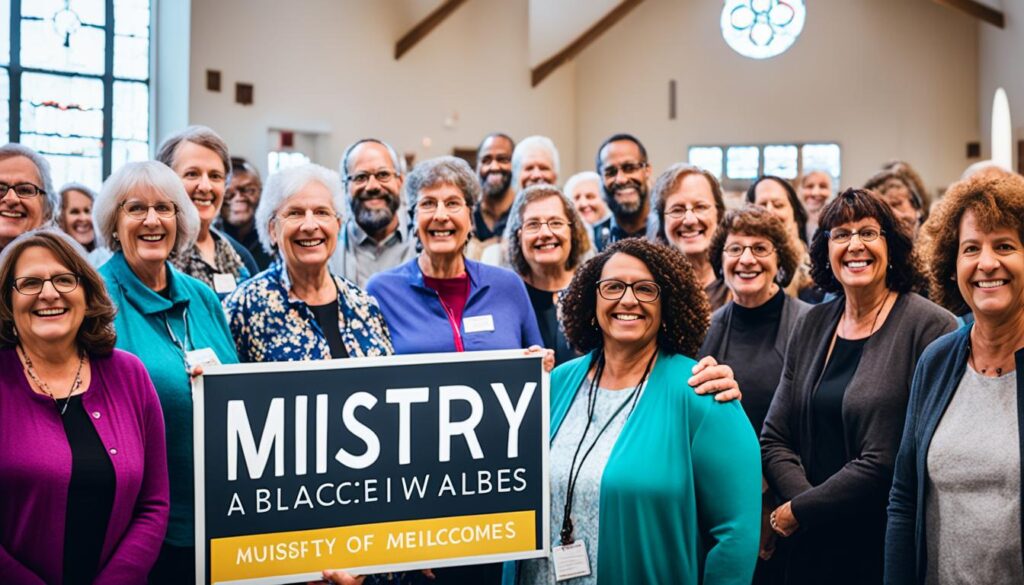Did you know that infidelity among church leaders, particularly elders, is a distressing reality within the faith community? This unexpected fact sheds light on the moral dilemma and significant impact that arises when a respected church leader engages in extramarital affairs and seeks divorce. In this article, we will delve into the complex perspectives and reflections surrounding this sensitive topic, exploring the implications it has on the faith community and the discussions it sparks.
Key Takeaways:
- The issue of a church leader’s infidelity and divorce poses a challenging moral dilemma.
- This unexpected reality can have a significant impact on the faith community.
- Exploring multiple perspectives and reflections is crucial in addressing and understanding this complex issue.
- Discussion around infidelity and divorce among church leaders highlights the need to navigate between biblical teachings and practical considerations.
- Providing support and understanding to all parties involved is essential for healing and growth.
The Frequency of the Issue in American Christianity
Infidelity among church leaders, including elders, is a prevalent and concerning issue that many churches in the United States grapple with. The impact of this behavior extends beyond individual relationships and has broader implications for small churches and their understanding of divorced and remarried individuals in leadership positions.
The frequency of infidelity among church leaders is a topic of ongoing discussion and reflection in contemporary American Christianity. Small churches, in particular, face unique challenges in finding qualified individuals to serve in church leadership roles. This challenge is further compounded when considering the views on divorced and remarried persons in church leadership.
Small churches typically have limited pools of eligible candidates for leadership positions (impact on small churches). As a result, they may need to adapt their stance on divorced and remarried individuals to ensure they have sufficient leadership to guide and shepherd the congregation. While some churches maintain strict criteria that exclude divorced and remarried individuals from leadership roles, others recognize the value of their experiences and allow them to serve in various capacities.
Views on divorced and remarried persons in church leadership positions range from complete exclusion to more nuanced approaches. Some churches adhere strictly to the belief that divorced individuals should not hold leadership roles due to biblical teachings on divorce and remarriage. However, there is an increasing recognition that divorced and remarried individuals can bring unique perspectives, experiences, and growth to the church community. This shift in perspective is influenced by ongoing conversations around grace, redemption, and the understanding that no individual is exempt from experiencing brokenness.
“While the frequency of infidelity among church leaders remains a concern, it is important for churches to carefully consider the impact on small churches and their views on divorced and remarried individuals in church leadership positions.”
Recognizing the complexities surrounding the issue, it is crucial for churches to engage in thoughtful dialogue and reflection to navigate the various challenges and perspectives that arise. By fostering an environment of openness and understanding, churches can strive to address this sensitive topic with empathy, compassion, and a commitment to upholding biblical principles.
Biblical Perspective on Divorce and Remarriage
When examining the biblical view on divorce and remarriage, it is important to consider Jesus’ teachings and the acceptable grounds for divorce outlined in the Bible. Divorce, although seen as a permitted accommodation due to the hardness of human hearts, is not aligned with God’s original plan for marriage.
Jesus emphasized the seriousness of divorce, cautioning that it should only be considered in specific circumstances. According to His teachings, divorce is acceptable in cases of unrepentant sexual sin or desertion/abandonment by an unbeliever. These are the biblical grounds upon which divorce is permitted in the eyes of God.
Remarriage for Christians is only permissible if the divorce was on biblical grounds. It is important to note that the Bible does not differentiate between pre-conversion and post-conversion divorces when it comes to their impact on church leadership. In the absence of biblical grounds for divorce, remarriage would not be considered acceptable from a biblical standpoint.
“Beloved, let us love one another, for love is from God, and whoever loves has been born of God and knows God.” – 1 John 4:7
It is crucial for individuals studying and discussing the biblical view on divorce and remarriage to consider these teachings and the overarching message of love, grace, and forgiveness found throughout the Scriptures. By understanding the biblical perspective, churches can strive to navigate the complexities of marriages and divorce in a way that upholds the teachings of Jesus while extending compassion and support to all individuals involved.

Acceptable Grounds for Divorce According to Jesus’ Teachings
Jesus emphasized that divorce should only be considered in cases of:
- Unrepentant sexual sin
- Desertion or abandonment by an unbeliever
These specific situations meet the acceptable grounds for divorce as outlined in the teachings of Jesus.
| Grounds for Divorce | Description |
|---|---|
| Unrepentant Sexual Sin | If one spouse engages in sexual immorality and refuses to repent, divorce may be considered on biblical grounds. |
| Desertion/Abandonment by an Unbeliever | If a non-believing spouse chooses to leave the marriage and shows no desire for reconciliation, divorce may be permissible based on biblical teachings. |
Eligibility for Church Ministry Roles
While repentant divorced and remarried individuals can serve faithfully in various non-pastoral church ministry positions, such as Sunday school teachers or ushers, the eligibility for pastoral and deacon roles is often questioned. The understanding is that divorce brings a certain reproach that cannot be removed, and therefore, divorced individuals are typically excluded from serving as pastors or deacons based on biblical principles. Some churches create unofficial positions, such as treasurer or church clerk, to allow strategically serving the congregation.
When it comes to eligibility for pastoral and deacon roles, churches adhere to the belief that divorce carries a significant impact on a person’s eligibility for church leadership. This stance is rooted in biblical teachings, where the sacredness of marriage is emphasized, and divorce is regarded as a deviation from God’s plan for marriage. In light of this, churches often consider divorce as a factor that tarnishes one’s reputation and calls into question their ability to provide effective leadership within the faith community.
These biblical principles guide the decision-making process in many churches, leading to the exclusion of divorced individuals from pastoral and deacon roles. The reasoning behind this exclusion is the belief that divorce brings a certain reproach that cannot be removed, compromising the individual’s ability to fulfill the requirements and responsibilities associated with these leadership positions. By adhering to these principles, churches aim to uphold the sanctity of marriage and maintain a sense of moral integrity within their leadership.
However, it’s important to note that the exclusion of divorced individuals from pastoral and deacon roles does not negate their ability to serve in other influential and impactful ministry positions within the church. Many churches offer a range of non-pastoral roles that provide opportunities for repentant and remarried individuals to serve faithfully and make meaningful contributions to the faith community.
These non-pastoral ministry positions, such as Sunday school teachers or ushers, allow individuals to utilize their gifts and talents while still respecting the biblical principles regarding divorce and leadership. By serving in these roles, divorced individuals can continue to actively participate in the life of the church and make a difference in the lives of others. Embracing these opportunities fosters a sense of belonging and purpose, enabling individuals to contribute their unique perspectives and experiences to the ministry.
Some churches have also created unofficial positions, such as treasurer or church clerk, to strategically involve divorced individuals in leadership activities that do not directly coincide with the traditional pastoral or deacon roles. These unofficial positions provide an avenue for individuals to serve and exercise their abilities, contributing to the overall functioning of the church while respecting the concerns and principles surrounding divorce.
Ultimately, the issue of eligibility for church ministry roles for divorced individuals is one that churches approach with thoughtful consideration of biblical teachings, theological perspectives, and the desire to maintain the integrity of leadership positions. While the exclusions may exist, it is important to recognize that the faith community can benefit from the diverse experiences and gifts that divorced individuals bring to non-pastoral ministry positions, ultimately enriching the overall ministry and mission of the church.

| Ministry Roles | Eligibility for Divorced Individuals |
|---|---|
| Pastoral Roles (e.g., Pastor, Senior Pastor) | Generally excluded based on biblical principles |
| Deacon Roles | Typically excluded due to perceived reproach |
| Non-Pastoral Ministry Positions (e.g., Sunday School Teacher, Usher) | Welcomed and encouraged for divorced individuals |
| Unofficial Positions (e.g., Treasurer, Church Clerk) | Created strategically to involve divorced individuals |
The Emotional Toll on the Faithful Partner
The emotional impact of infidelity and divorce can be devastating for the faithful partner. Discovering that their spouse has been unfaithful and facing the reality of divorce creates significant turmoil and upheaval in their lives. They experience a wide range of difficult emotions, including heartbreak, betrayal, anger, sadness, and confusion.
“I never imagined that this could happen to us. The pain of infidelity and the prospect of going through a divorce has been overwhelming. I find myself constantly questioning what went wrong and if I could have done anything differently.”
– Jennifer, a betrayed spouse
The faithful partner may also be burdened with a sense of blame and guilt. They may question their own role in the infidelity, wondering if they did something to cause their spouse to cheat. These feelings can be incredibly damaging to their self-esteem and overall well-being.
“I can’t help but wonder if I somehow pushed my spouse away or failed to meet their needs. I carry so much guilt, even though deep down, I know that infidelity is ultimately a choice that my spouse made.”
– Mark, a faithful partner
During this challenging time, the significance of support from the faith community cannot be overstated. The faithful partner needs a safe space where they can share their pain, express their emotions, and seek guidance. The faith community can provide a compassionate and non-judgmental environment that fosters healing and restoration.
When the faithful partner receives support from their faith community, it can help them navigate the complexities of their faith in the midst of the betrayal. It reassures them that they are not alone in their struggles and encourages them to lean on their spiritual beliefs for strength and comfort.
The faith community can offer practical support, such as connecting the faithful partner with counseling services, support groups, or professional therapists who specialize in helping individuals heal from infidelity and divorce. They can also provide emotional support through prayer, listening, and offering a shoulder to lean on during difficult times.
The emotional toll of infidelity and divorce on the faithful partner is immense. By recognizing the impact of their emotions, addressing any feelings of blame and guilt, and receiving support from their faith community, the faithful partner can begin the journey of healing and find solace in their faith.

Spiritual Abuse and Infidelity
In the aftermath of infidelity, the faithful partner may find themselves not only dealing with the pain of betrayal but also experiencing spiritual abuse. This form of abuse can have a profound impact on their emotional well-being and faith.
Spiritual abuse often involves blaming the faithful partner for the infidelity, placing the burden of the affair on their shoulders. Instead of holding the unfaithful partner accountable for their actions, they may be made to feel responsible for the breakdown of the relationship. This blame can lead to feelings of guilt, shame, and self-doubt.
“You should have kept your partner satisfied. This wouldn’t have happened if you had been a better spouse.”
In addition to blame, the faithful partner may face pressure to forgive and reconcile with their unfaithful spouse, regardless of the presence of ongoing infidelity. This pressure often comes from within the faith community, where the emphasis is placed on forgiveness, reconciliation, and the preservation of marriage at all costs.
“You should forgive and forget. It is your duty as a faithful Christian to reconcile with your spouse, no matter what they have done.”
Such pressure can be overwhelming and may disregard the emotional and psychological well-being of the faithful partner. It can prevent them from fully processing the pain and trauma of the infidelity and force them into a situation where their needs and boundaries are not respected.
Addressing spiritual abuse in the context of infidelity requires a compassionate and supportive approach. Faith communities should prioritize the well-being of the faithful partner and provide them with the space to heal and seek justice. Instead of placing the blame on the victim, emphasis should be placed on holding the unfaithful partner accountable and encouraging them to take responsibility for their actions.
A supportive faith community should also acknowledge and respect the boundaries and choices of the faithful partner. This includes affirming their decision to seek separation or divorce if it is necessary for their safety and well-being. By creating an environment of understanding and empathy, faith communities can help victims of spiritual abuse navigate the complex aftermath of infidelity and find healing.
Remember, it is essential to seek professional support from therapists or support groups specializing in infidelity and spiritual abuse. These resources can provide additional guidance and validation for the faithful partner as they navigate their healing journey.

| Effects of Spiritual Abuse | Examples |
|---|---|
| Emotional trauma | Anxiety, depression, self-doubt |
| Feelings of guilt and shame | Blaming oneself for the infidelity |
| Loss of faith or spiritual disillusionment | Questioning one’s beliefs and values |
| Isolation and alienation | Feeling unsupported or judged by the faith community |
Support for Those Facing Infidelity and Divorce
Going through infidelity and divorce can be an incredibly challenging and painful experience, especially for individuals who are part of the faith community. During this difficult time, finding support that offers understanding and empathy becomes crucial.
Within the church community, there is a unique opportunity for individuals to lean on their fellow members and leaders for support. The church can provide a safe space where individuals can share their pain, fears, and doubts. Fellow members can offer a listening ear, words of encouragement, and prayers to uplift those facing these emotional struggles. Counseling services within the church can also be instrumental in providing guidance, facilitating healing, and helping individuals navigate the complexities of their emotions and faith.
It is important to note that support for those facing infidelity and divorce should not be limited to the faith community alone. Seeking external help from professional therapists who specialize in marriage and family counseling can provide valuable insights and tools for healing. Support groups, both within and outside the church, can also offer a sense of community and understanding, connecting individuals with others who have experienced similar challenges and can relate to their journey.
Remember, healing takes time, and it is important to be patient with yourself during this process. Surround yourself with people who can offer understanding and empathy as you navigate the ups and downs of recovery.

Through the combined efforts of the church community, professional therapists, and support groups, individuals facing infidelity and divorce can find the understanding and empathy they need to heal and move forward. It is a journey that requires support from various sources, as each offers unique perspectives and resources to aid in the recovery process.
Finding Understanding and Empathy
- Active Listening: Church members and leaders can practice active listening to create a safe space for individuals to express their emotions without judgment or interruption.
- Prayer: Praying together as a community can provide comfort and solace during moments of deep pain and uncertainty.
- Support Groups: Joining support groups comprised of individuals who have faced similar experiences can offer a sense of belonging and understanding.
Lessons from Personal Experiences
Personal testimonies play a crucial role in shaping perspectives on divorced leaders within the church, offering valuable insights into the process of finding healing and redemption. Through these stories, individuals who have experienced infidelity and divorce as church leaders shed light on the complexities and challenges faced by the faithful partner.
These personal testimonies reveal the transformative power of finding healing and redemption in the midst of such difficult circumstances. They demonstrate how individuals can navigate through the pain and trauma, ultimately emerging stronger and more resilient. These stories inspire hope and serve as a reminder that healing is possible, even in the wake of infidelity and divorce.
“Through my personal journey, I have learned that finding healing and redemption is not a linear process. It requires vulnerability, self-reflection, and the willingness to seek support from the faith community and professional therapists. I have discovered that God’s grace and love are always present, guiding me towards a place of restoration and growth.” – Sarah Thompson, former church leader
By sharing their personal experiences, individuals who have faced infidelity and divorce as church leaders contribute to a broader understanding of the complexities surrounding divorced leaders. Their stories challenge preconceived notions and encourage the church to reevaluate its perspectives on whether divorced individuals can serve in leadership positions.
These personal testimonies highlight the importance of empathy and compassion within the faith community, as well as the need to provide support and understanding to those navigating through the aftermath of infidelity and divorce. They inspire a shift in mindset, encouraging the church to embrace the healing and redemption that can come from walking alongside these individuals on their journeys.
Charting the Path to Healing and Redemption
Key themes emerge from personal testimonies of church leaders who have experienced infidelity and divorce:
| Themes | Insights |
|---|---|
| Finding Support | Personal testimonies emphasize the importance of finding support from the faith community, professional therapists, and support groups to navigate the emotional and spiritual toll of infidelity and divorce. |
| Embracing Forgiveness | Many testimonies speak to the power of forgiveness in the healing process, both towards the unfaithful partner and oneself, as an essential step towards finding redemption. |
| Rebuilding Identity | The testimonies highlight the challenging process of rebuilding one’s identity following the breakdown of a marriage, emphasizing the importance of self-discovery and growth. |
| Seeking Redemption | These stories demonstrate that experiences of infidelity and divorce can be catalysts for spiritual growth and a deeper understanding of God’s love and grace. |
Personal testimonies provide invaluable insights into the journey of finding healing and redemption as a divorced leader. Through empathy, understanding, and an open mind, the church can navigate the complexities of this issue, shaping its perspectives to reflect its commitment to love, grace, and the transformative power of redemption.

Finding a New Faith Community
After going through the painful experience of infidelity, divorce, and possibly spiritual abuse, finding a new faith community can play a crucial role in the healing and rebuilding process. A supportive faith community provides understanding, acceptance, and guidance, allowing the faithful partner to embark on a journey of renewed trust and continued spiritual growth.
It is important to acknowledge that not all churches respond in the same way to these challenging circumstances. Some may be more equipped to offer the necessary support, empathy, and grace needed during this difficult time. Seeking out a community that aligns with personal values and provides a safe space for healing can be instrumental in rebuilding trust and fostering a deepened spiritual connection.
When searching for a supportive faith community, there are several factors to consider:
- Doctrinal alignment: Ensure that the beliefs and teachings of the new community align with personal convictions and theological understanding. This alignment creates a foundation of shared values and facilitates a sense of belonging and connection.
- Leadership approach: Explore how the church’s leadership addresses and supports individuals facing infidelity and divorce. Look for leaders who prioritize compassion, understanding, and guidance, fostering an environment that promotes healing and growth.
- Emphasis on community: A strong sense of community is vital in finding a supportive faith community. Look for churches that prioritize fellowship, small group engagement, and opportunities for meaningful connection. These elements provide a network of support and offer a sense of belonging and community.
- Worship style: Consider the worship style and atmosphere that resonates with personal preferences and spiritual needs. Whether it be contemporary, traditional, or a blend of styles, finding a community that creates a conducive environment for worship and spiritual nourishment enhances the overall experience.
- Resources for healing: Look for churches that offer resources and programs dedicated to healing and restoration. These may include support groups, counseling services, or pastoral care ministries. These resources can assist in addressing the emotional and spiritual aftermath of infidelity and divorce.
By finding a supportive faith community, the faithful partner can begin the process of rebuilding trust, experiencing healing, and nurturing continued spiritual growth. This new chapter provides an opportunity to surround oneself with like-minded individuals who can walk alongside, offering support, encouragement, and understanding.
Testimonial: A Journey of Healing
“When I found myself facing the aftermath of infidelity and divorce, I was uncertain about where I would find acceptance and understanding within the church community. Through prayer and exploration, I discovered a faith community that welcomed me with open arms. The supportive environment, coupled with resources for healing, has been instrumental in my journey of rebuilding trust and finding renewed spiritual growth. I am grateful to have found a community that truly embodies God’s love.”
– Rebecca Thompson

Conclusion
Navigating the complexities of infidelity and divorce within the church, especially when involving a church leader, presents a unique set of challenges for the faith community. It is crucial to approach these situations with open hearts and minds, engaging in compassionate discussions. By considering biblical teachings, personal testimonies, and the importance of support and understanding, churches can address these moral dilemmas with love, grace, and healing.
Creating a space for healthy dialogue is essential in nurturing an environment that fosters growth and understanding. By encouraging open conversations about infidelity and divorce, churches can navigate the complexities of these situations and strive to find balanced solutions. Acknowledging the pain and emotional toll experienced by the faithful partner is crucial, and providing the necessary support can aid in their healing process.
While there are different perspectives on the eligibility of divorced individuals for church leadership roles, it is important to approach these discussions with empathy and discernment. Personal testimonies from those who have experienced infidelity and divorce can shed light on the journey of healing and redemption. These stories can inspire a deeper understanding of the complexities faced by the faithful partner and contribute to shaping perspectives on divorced leaders within the church.
Ultimately, navigating the complexities of infidelity and divorce in the church requires a commitment to love, grace, and understanding. By upholding these principles and fostering an environment of support, churches can continue to navigate these challenges with compassion and ensure that the faith community remains a place of healing and growth.









